专业英语(历史学)考试题型与复习攻略
- 格式:docx
- 大小:11.72 KB
- 文档页数:2
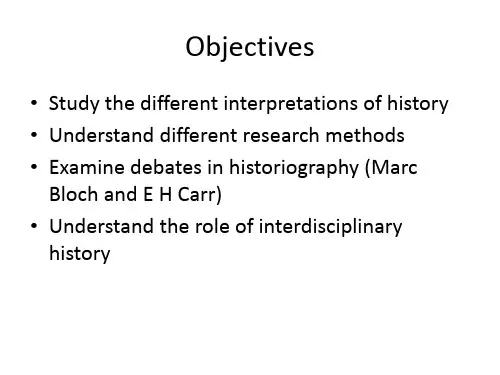
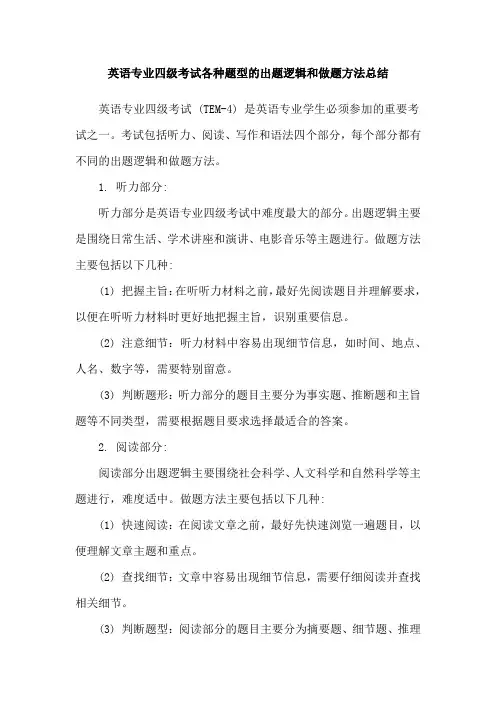
英语专业四级考试各种题型的出题逻辑和做题方法总结英语专业四级考试 (TEM-4) 是英语专业学生必须参加的重要考试之一。
考试包括听力、阅读、写作和语法四个部分,每个部分都有不同的出题逻辑和做题方法。
1. 听力部分:听力部分是英语专业四级考试中难度最大的部分。
出题逻辑主要是围绕日常生活、学术讲座和演讲、电影音乐等主题进行。
做题方法主要包括以下几种:(1) 把握主旨:在听听力材料之前,最好先阅读题目并理解要求,以便在听听力材料时更好地把握主旨,识别重要信息。
(2) 注意细节:听力材料中容易出现细节信息,如时间、地点、人名、数字等,需要特别留意。
(3) 判断题形:听力部分的题目主要分为事实题、推断题和主旨题等不同类型,需要根据题目要求选择最适合的答案。
2. 阅读部分:阅读部分出题逻辑主要围绕社会科学、人文科学和自然科学等主题进行,难度适中。
做题方法主要包括以下几种:(1) 快速阅读:在阅读文章之前,最好先快速浏览一遍题目,以便理解文章主题和重点。
(2) 查找细节:文章中容易出现细节信息,需要仔细阅读并查找相关细节。
(3) 判断题型:阅读部分的题目主要分为摘要题、细节题、推理题和主旨题等不同类型,需要根据题目要求选择最适合的答案。
3. 写作部分:写作部分出题逻辑主要是围绕学术论文写作进行,要求考生在规定时间内完成一篇命题作文。
做题方法主要包括以下几种:(1) 审题立意:在写作之前,首先要仔细阅读题目要求,明确写作主题和要点。
(2) 构思提纲:在审题之后,应该先构思写作提纲,明确思路和要点。
(3) 规范格式:在完成写作之后,要注意规范格式,包括作文标题、段落划分、字体大小和间距等。
4. 语法部分:语法部分出题逻辑主要是围绕英语语法进行,要求考生在规定时间内完成一系列语法练习题。
做题方法主要包括以下几种:(1) 理清脉络:在做题之前,最好先理清语法脉络,明确各类语法结构的用法和特点。
(2) 对比辨析:在做题过程中,可以通过对比辨析的方式找出正确答案。
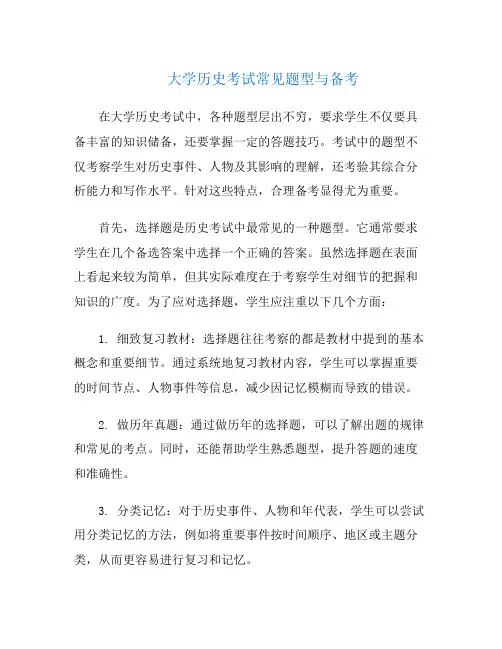
大学历史考试常见题型与备考在大学历史考试中,各种题型层出不穷,要求学生不仅要具备丰富的知识储备,还要掌握一定的答题技巧。
考试中的题型不仅考察学生对历史事件、人物及其影响的理解,还考验其综合分析能力和写作水平。
针对这些特点,合理备考显得尤为重要。
首先,选择题是历史考试中最常见的一种题型。
它通常要求学生在几个备选答案中选择一个正确的答案。
虽然选择题在表面上看起来较为简单,但其实际难度在于考察学生对细节的把握和知识的广度。
为了应对选择题,学生应注重以下几个方面:1. 细致复习教材:选择题往往考察的都是教材中提到的基本概念和重要细节。
通过系统地复习教材内容,学生可以掌握重要的时间节点、人物事件等信息,减少因记忆模糊而导致的错误。
2. 做历年真题:通过做历年的选择题,可以了解出题的规律和常见的考点。
同时,还能帮助学生熟悉题型,提升答题的速度和准确性。
3. 分类记忆:对于历史事件、人物和年代表,学生可以尝试用分类记忆的方法,例如将重要事件按时间顺序、地区或主题分类,从而更容易进行复习和记忆。
其次,简答题也是历史考试中的重要组成部分。
简答题通常要求学生在简短的文字中准确回答问题。
要在简答题中取得好成绩,学生需要:1. 明确问题重点:简答题的问题通常是非常具体的,学生需要抓住题目中的关键词,准确理解问题的要求,并在答题时紧扣这些重点。
2. 结构清晰:简答题的答案要结构清晰,逻辑严谨。
一般情况下,可以先简明扼要地回答问题,然后再补充必要的细节和解释,确保答案全面而不冗长。
3. 掌握核心知识点:简答题通常考察的是对知识点的掌握情况。
通过复习教材中的核心知识点和重要概念,学生可以更好地应对这些题目。
再者,论述题是历史考试中的一项重要考查内容,考查的主要是学生对某一历史主题的深入理解和分析能力。
论述题往往需要学生展开详细的论证,因此备考时应注意以下几点:1. 形成明确观点:论述题通常需要学生对某一历史问题提出观点并加以论证。
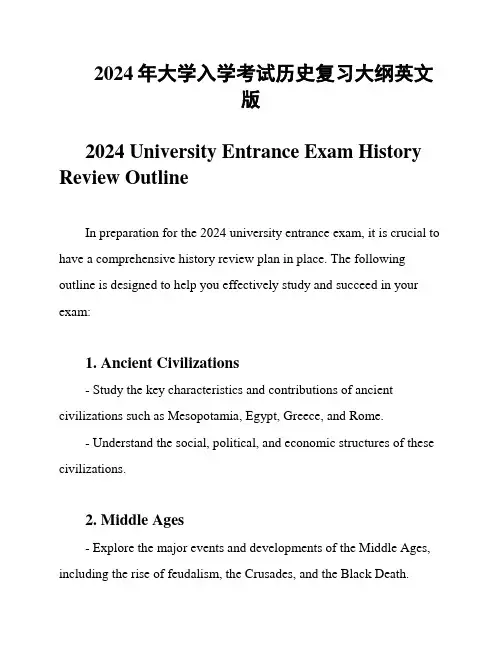
2024年大学入学考试历史复习大纲英文版2024 University Entrance Exam History Review OutlineIn preparation for the 2024 university entrance exam, it is crucial to have a comprehensive history review plan in place. The following outline is designed to help you effectively study and succeed in your exam:1. Ancient Civilizations- Study the key characteristics and contributions of ancient civilizations such as Mesopotamia, Egypt, Greece, and Rome.- Understand the social, political, and economic structures of these civilizations.2. Middle Ages- Explore the major events and developments of the Middle Ages, including the rise of feudalism, the Crusades, and the Black Death.- Analyze the cultural and intellectual advancements of the time period.3. Renaissance and Reformation- Examine the impact of the Renaissance on art, science, and culture.- Study the causes and consequences of the Protestant Reformation.4. Age of Exploration- Learn about the motivations and outcomes of European exploration and colonization.- Understand the global exchange of goods, ideas, and diseases during this period.5. Enlightenment and Revolution- Explore the ideas of Enlightenment philosophers such as Voltaire, Rousseau, and Locke.- Analyze the causes and effects of major revolutions, such as the American and French Revolutions.6. Industrial Revolution- Understand the technological advancements and social transformations of the Industrial Revolution.- Examine the impact of industrialization on urbanization and class relations.7. 20th Century World Wars- Study the causes and consequences of World War I and World War II.- Analyze the impact of these conflicts on global politics, economics, and society.8. Cold War and Post-War Period- Explore the ideological and geopolitical tensions of the Cold War.- Examine the decolonization movements and the emergence of new nation-states.9. Contemporary Global Issues- Investigate current events and their historical roots, such as globalization, environmental challenges, and human rights movements.- Analyze the interconnectedness of the modern world and the role of history in shaping our present.By following this history review outline and dedicating time to each period and topic, you will be well-prepared for the 2024 university entrance exam. Good luck with your studies!。
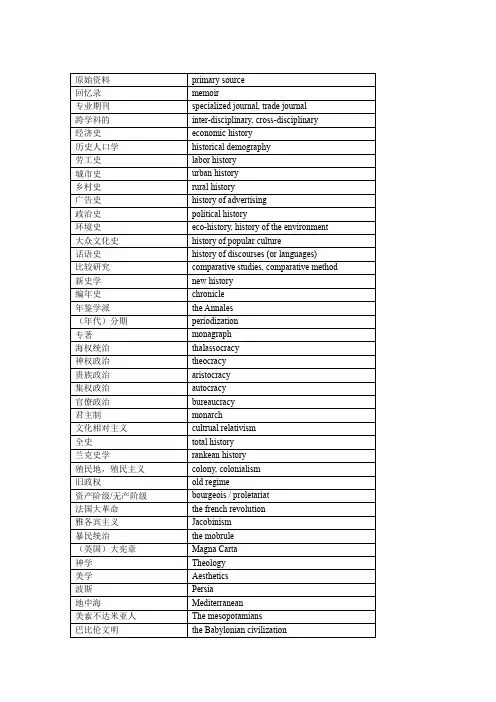
一些形容词和副词用法短语一些连词和短语thereforeHistoricans, therefore, have to assess their evidence with a critical eye.It is therefore difficult to offer mor than a vague description…I shall therefore propound answers to my four questions…moreoverMoreover, the purpose of history as a serious endeavor to understand human life is never fulfilled by the mere sifting of evidence for facts.furthermoreEach such revolution, furthermore, has occurred in a particular way in a unique set of social –structural and international circumstances.henceHence this part demonstrates how the conflicts unleashed in the revolutionalry crises led to social –revolutionary outcomes, with certain patterns common to all three Revolutions and others distinctive to one or two of them…thus…the experience of historical thinking which hey have thus acquired…be inclined toHistorians are increasingly inclined to discuss the struggle for power at the level of the factory, the school, or even the family.in so far asIt is scientifically valuable only in so far as the new arrangement gives us the answer to a question we have already decided to ask.sum up… the contrast between old and new history might be summed up in six points.be dated from, be dated back to…democracy, as a practical word, can be dated from about the same time..to a large extent, to some extentIt is true that all these advancces were based to a large extent on the exploitation of the many and benefited them very little.in principleEverything has a past, which can in principle be reconstructed and related to the rest of the past.in particularHe must be not only an histrian but a philosopher; and in particular his philosophical thought musthave included sepeical attention to the problems of historical thought. 提出观点用语I think…I suggest…I argueI propound…I propose..。
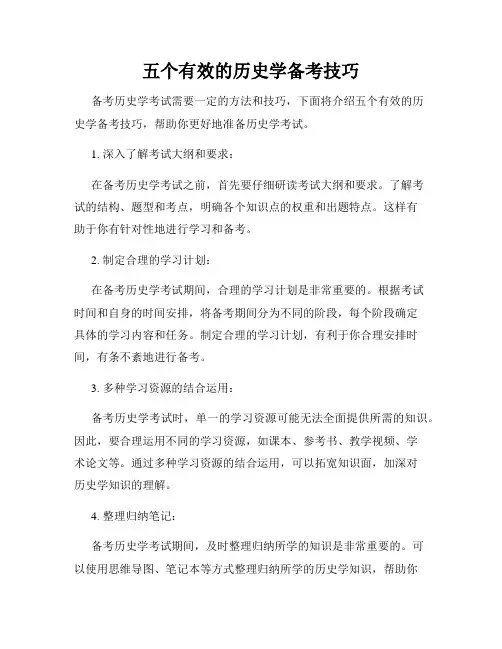
五个有效的历史学备考技巧备考历史学考试需要一定的方法和技巧,下面将介绍五个有效的历史学备考技巧,帮助你更好地准备历史学考试。
1. 深入了解考试大纲和要求:在备考历史学考试之前,首先要仔细研读考试大纲和要求。
了解考试的结构、题型和考点,明确各个知识点的权重和出题特点。
这样有助于你有针对性地进行学习和备考。
2. 制定合理的学习计划:在备考历史学考试期间,合理的学习计划是非常重要的。
根据考试时间和自身的时间安排,将备考期间分为不同的阶段,每个阶段确定具体的学习内容和任务。
制定合理的学习计划,有利于你合理安排时间,有条不紊地进行备考。
3. 多种学习资源的结合运用:备考历史学考试时,单一的学习资源可能无法全面提供所需的知识。
因此,要合理运用不同的学习资源,如课本、参考书、教学视频、学术论文等。
通过多种学习资源的结合运用,可以拓宽知识面,加深对历史学知识的理解。
4. 整理归纳笔记:备考历史学考试期间,及时整理归纳所学的知识是非常重要的。
可以使用思维导图、笔记本等方式整理归纳所学的历史学知识,帮助你系统化地掌握复习内容。
同时,通过整理归纳,可以加深对知识的理解和记忆。
5. 多做历年真题和模拟题:历年真题和模拟题对于备考历史学考试非常有帮助。
通过做历年真题和模拟题,可以熟悉考试的题型和出题风格,查漏补缺,提高解题能力和应对能力。
同时,也可以在做题过程中发现自己的不足,有针对性地进行复习和提高。
综上所述,备考历史学考试需要制定合理的学习计划,深入了解考试大纲和要求,并合理运用各种学习资源。
此外,及时整理归纳笔记和多做历年真题和模拟题也是备考历史学考试的重要技巧。
通过掌握这五个有效的历史学备考技巧,相信你能更好地应对历史学考试,取得优异的成绩。
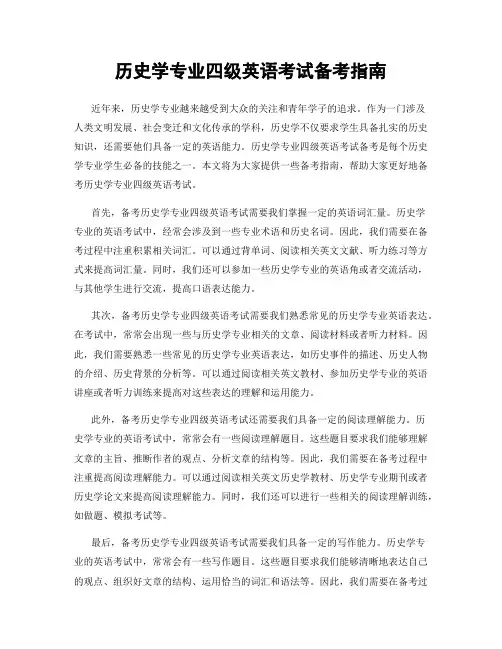
历史学专业四级英语考试备考指南近年来,历史学专业越来越受到大众的关注和青年学子的追求。
作为一门涉及人类文明发展、社会变迁和文化传承的学科,历史学不仅要求学生具备扎实的历史知识,还需要他们具备一定的英语能力。
历史学专业四级英语考试备考是每个历史学专业学生必备的技能之一。
本文将为大家提供一些备考指南,帮助大家更好地备考历史学专业四级英语考试。
首先,备考历史学专业四级英语考试需要我们掌握一定的英语词汇量。
历史学专业的英语考试中,经常会涉及到一些专业术语和历史名词。
因此,我们需要在备考过程中注重积累相关词汇。
可以通过背单词、阅读相关英文文献、听力练习等方式来提高词汇量。
同时,我们还可以参加一些历史学专业的英语角或者交流活动,与其他学生进行交流,提高口语表达能力。
其次,备考历史学专业四级英语考试需要我们熟悉常见的历史学专业英语表达。
在考试中,常常会出现一些与历史学专业相关的文章、阅读材料或者听力材料。
因此,我们需要熟悉一些常见的历史学专业英语表达,如历史事件的描述、历史人物的介绍、历史背景的分析等。
可以通过阅读相关英文教材、参加历史学专业的英语讲座或者听力训练来提高对这些表达的理解和运用能力。
此外,备考历史学专业四级英语考试还需要我们具备一定的阅读理解能力。
历史学专业的英语考试中,常常会有一些阅读理解题目。
这些题目要求我们能够理解文章的主旨、推断作者的观点、分析文章的结构等。
因此,我们需要在备考过程中注重提高阅读理解能力。
可以通过阅读相关英文历史学教材、历史学专业期刊或者历史学论文来提高阅读理解能力。
同时,我们还可以进行一些相关的阅读理解训练,如做题、模拟考试等。
最后,备考历史学专业四级英语考试需要我们具备一定的写作能力。
历史学专业的英语考试中,常常会有一些写作题目。
这些题目要求我们能够清晰地表达自己的观点、组织好文章的结构、运用恰当的词汇和语法等。
因此,我们需要在备考过程中注重提高写作能力。
可以通过写作练习、参加写作讲座或者写作指导来提高写作能力。
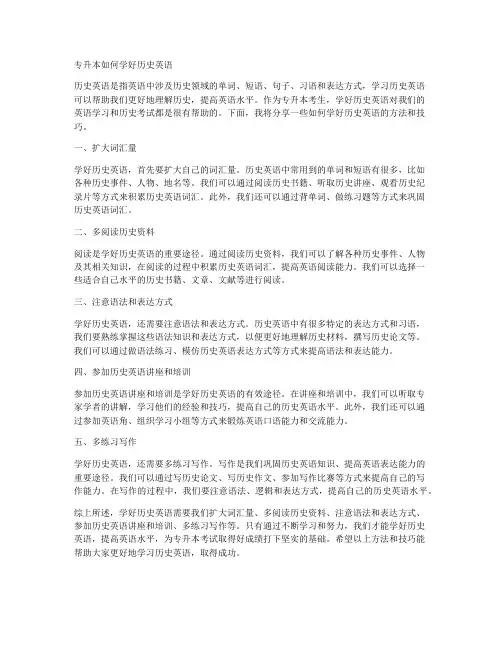
专升本如何学好历史英语历史英语是指英语中涉及历史领域的单词、短语、句子、习语和表达方式,学习历史英语可以帮助我们更好地理解历史,提高英语水平。
作为专升本考生,学好历史英语对我们的英语学习和历史考试都是很有帮助的。
下面,我将分享一些如何学好历史英语的方法和技巧。
一、扩大词汇量学好历史英语,首先要扩大自己的词汇量。
历史英语中常用到的单词和短语有很多,比如各种历史事件、人物、地名等。
我们可以通过阅读历史书籍、听取历史讲座、观看历史纪录片等方式来积累历史英语词汇。
此外,我们还可以通过背单词、做练习题等方式来巩固历史英语词汇。
二、多阅读历史资料阅读是学好历史英语的重要途径。
通过阅读历史资料,我们可以了解各种历史事件、人物及其相关知识,在阅读的过程中积累历史英语词汇,提高英语阅读能力。
我们可以选择一些适合自己水平的历史书籍、文章、文献等进行阅读。
三、注意语法和表达方式学好历史英语,还需要注意语法和表达方式。
历史英语中有很多特定的表达方式和习语,我们要熟练掌握这些语法知识和表达方式,以便更好地理解历史材料,撰写历史论文等。
我们可以通过做语法练习、模仿历史英语表达方式等方式来提高语法和表达能力。
四、参加历史英语讲座和培训参加历史英语讲座和培训是学好历史英语的有效途径。
在讲座和培训中,我们可以听取专家学者的讲解,学习他们的经验和技巧,提高自己的历史英语水平。
此外,我们还可以通过参加英语角、组织学习小组等方式来锻炼英语口语能力和交流能力。
五、多练习写作学好历史英语,还需要多练习写作。
写作是我们巩固历史英语知识、提高英语表达能力的重要途径。
我们可以通过写历史论文、写历史作文、参加写作比赛等方式来提高自己的写作能力。
在写作的过程中,我们要注意语法、逻辑和表达方式,提高自己的历史英语水平。
综上所述,学好历史英语需要我们扩大词汇量、多阅读历史资料、注意语法和表达方式、参加历史英语讲座和培训、多练习写作等。
只有通过不断学习和努力,我们才能学好历史英语,提高英语水平,为专升本考试取得好成绩打下坚实的基础。
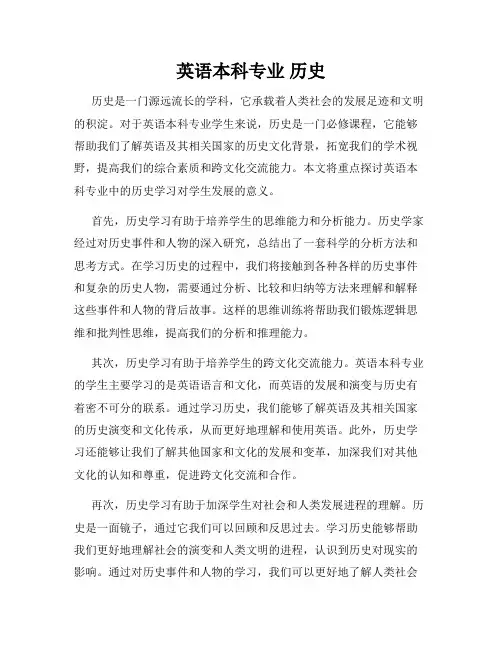
英语本科专业历史历史是一门源远流长的学科,它承载着人类社会的发展足迹和文明的积淀。
对于英语本科专业学生来说,历史是一门必修课程,它能够帮助我们了解英语及其相关国家的历史文化背景,拓宽我们的学术视野,提高我们的综合素质和跨文化交流能力。
本文将重点探讨英语本科专业中的历史学习对学生发展的意义。
首先,历史学习有助于培养学生的思维能力和分析能力。
历史学家经过对历史事件和人物的深入研究,总结出了一套科学的分析方法和思考方式。
在学习历史的过程中,我们将接触到各种各样的历史事件和复杂的历史人物,需要通过分析、比较和归纳等方法来理解和解释这些事件和人物的背后故事。
这样的思维训练将帮助我们锻炼逻辑思维和批判性思维,提高我们的分析和推理能力。
其次,历史学习有助于培养学生的跨文化交流能力。
英语本科专业的学生主要学习的是英语语言和文化,而英语的发展和演变与历史有着密不可分的联系。
通过学习历史,我们能够了解英语及其相关国家的历史演变和文化传承,从而更好地理解和使用英语。
此外,历史学习还能够让我们了解其他国家和文化的发展和变革,加深我们对其他文化的认知和尊重,促进跨文化交流和合作。
再次,历史学习有助于加深学生对社会和人类发展进程的理解。
历史是一面镜子,通过它我们可以回顾和反思过去。
学习历史能够帮助我们更好地理解社会的演变和人类文明的进程,认识到历史对现实的影响。
通过对历史事件和人物的学习,我们可以更好地了解人类社会的发展规律和历史的教训,从而更好地面对和应对现实生活中的挑战和问题。
最后,历史学习能够培养学生的独立思考和批判精神。
历史学习强调的不仅仅是知识的掌握,更重要的是对历史事件和人物的深入思考和评价。
通过学习历史,我们可以学会独立思考,发展自己的观点和看法,并能够批判性地评价不同历史观点和解释。
这样的能力培养将有助于我们在学术研究和职业生涯中拥有独立思考和创新精神。
综上所述,英语本科专业中的历史学习对学生的发展具有重要的意义。
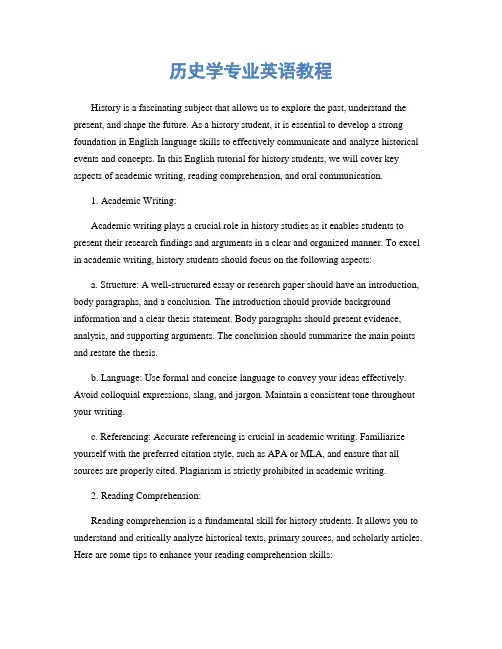
历史学专业英语教程History is a fascinating subject that allows us to explore the past, understand the present, and shape the future. As a history student, it is essential to develop a strong foundation in English language skills to effectively communicate and analyze historical events and concepts. In this English tutorial for history students, we will cover key aspects of academic writing, reading comprehension, and oral communication.1. Academic Writing:Academic writing plays a crucial role in history studies as it enables students to present their research findings and arguments in a clear and organized manner. To excel in academic writing, history students should focus on the following aspects:a. Structure: A well-structured essay or research paper should have an introduction, body paragraphs, and a conclusion. The introduction should provide background information and a clear thesis statement. Body paragraphs should present evidence, analysis, and supporting arguments. The conclusion should summarize the main points and restate the thesis.b. Language: Use formal and concise language to convey your ideas effectively. Avoid colloquial expressions, slang, and jargon. Maintain a consistent tone throughout your writing.c. Referencing: Accurate referencing is crucial in academic writing. Familiarize yourself with the preferred citation style, such as APA or MLA, and ensure that all sources are properly cited. Plagiarism is strictly prohibited in academic writing.2. Reading Comprehension:Reading comprehension is a fundamental skill for history students. It allows you to understand and critically analyze historical texts, primary sources, and scholarly articles. Here are some tips to enhance your reading comprehension skills:a. Preview: Before reading a text, skim through the headings, subheadings, and introductory paragraphs to get an overview of the content. This will help you identify the main ideas and anticipate the author's arguments.b. Active Reading: While reading, actively engage with the text by highlighting important points, taking notes, and asking questions. This will help you retain information and facilitate critical thinking.c. Analyze: After reading, analyze the author's arguments, evidence, and biases. Consider the historical context and evaluate the credibility of the source. Compare different perspectives to develop a well-rounded understanding.3. Oral Communication:Oral communication skills are essential for history students, as they often need to present their research findings, participate in discussions, and engage in debates. Here are some strategies to improve your oral communication skills:a. Preparation: Before a presentation or discussion, thoroughly research the topic and organize your thoughts. Prepare a clear and concise outline to guide your speech.b. Clarity: Speak clearly and articulate your words. Use appropriate vocabulary and avoid excessive jargon. Maintain eye contact with your audience and use gestures to enhance your communication.c. Active Listening: Active listening is crucial in oral communication. Pay attention to others' viewpoints, ask questions, and provide thoughtful responses. Engage in constructive discussions and be open to different perspectives.In conclusion, mastering English language skills is essential for history students to excel in their academic pursuits. By focusing on academic writing, reading comprehension, and oral communication, students can effectively communicate their research findings, analyze historical texts, and actively participate in academic discussions. With consistent practice and dedication, history students can develop astrong foundation in English language skills and enhance their overall academic performance.。
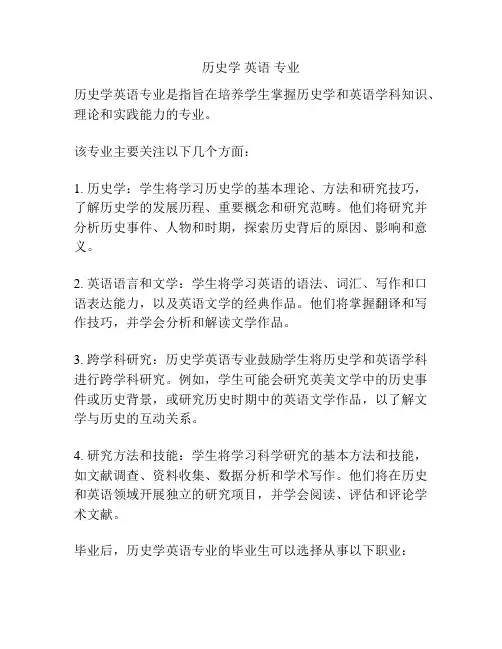
历史学英语专业
历史学英语专业是指旨在培养学生掌握历史学和英语学科知识、理论和实践能力的专业。
该专业主要关注以下几个方面:
1. 历史学:学生将学习历史学的基本理论、方法和研究技巧,了解历史学的发展历程、重要概念和研究范畴。
他们将研究并分析历史事件、人物和时期,探索历史背后的原因、影响和意义。
2. 英语语言和文学:学生将学习英语的语法、词汇、写作和口语表达能力,以及英语文学的经典作品。
他们将掌握翻译和写作技巧,并学会分析和解读文学作品。
3. 跨学科研究:历史学英语专业鼓励学生将历史学和英语学科进行跨学科研究。
例如,学生可能会研究英美文学中的历史事件或历史背景,或研究历史时期中的英语文学作品,以了解文学与历史的互动关系。
4. 研究方法和技能:学生将学习科学研究的基本方法和技能,如文献调查、资料收集、数据分析和学术写作。
他们将在历史和英语领域开展独立的研究项目,并学会阅读、评估和评论学术文献。
毕业后,历史学英语专业的毕业生可以选择从事以下职业:
1. 历史学家:可以从事历史研究、档案工作、文化保护和历史咨询等职业。
2. 英语教师:可以在学校、大学或语言培训机构教授英语语言和文学课程。
3. 翻译和口译员:可以从事英语和历史相关的翻译和口译工作,如翻译历史文献、演讲和会议的口译等。
4. 文化遗产保护者:可以参与文物保护、博物馆工作和历史旅游等领域,保护和传播人类历史和文化遗产。
总的来说,历史学英语专业将帮助学生培养历史研究和英语运用的能力,为他们的职业发展提供广阔的选择。
高考英语高频考点及二轮复习、备考建议高考英语高频考点及二轮复习、备考建议一.关于中国古代史部分中国古代史部分约占高考历史内容的 30%。
中国古代史范围广泛。
涉及时间久远,内容相当多,特别是朝代更迭频繁,史实庞杂,学生多反映不好复习掌握。
建议按以下几个方法复习,以取得优秀成绩。
1、按历史阶段了解时代特点。
从约 170 万年前的元谋人到公元 1840 年鸦片战争以前,中国历史的绝大部分年代属于古代历史。
古代历史大致可以分为 6 段,先秦时期,秦汉时期、魏晋南北朝时期、隋唐时期、五代宋元时期、明清时期。
这 6 段时代特点分别是:中国历史的开端及向封建社会过渡,封建社会巩固和初步发展,国家分裂和民族融合,封建社会的繁荣昌盛,封建经济的进一步发展和民族大融合,统一国家的巩固和封建制度的衰落。
要用相应的史实证明这些特点。
2.按类别归纳主要史实。
中国古代史按大类可以分作政治、经济、民族、外交、文化、人物 6 大类。
政治类还可以分作中央集权加强.古代改革、对地方管辖、用人制度、平叛斗争、腐败亡国等专题。
经济类可以分作经济思想、赋税制度、生产工具、商品经济、土地政策、政策调整、社会生活等专题。
民族类可以分作民族演变、民族政策、民族融合、各族经济文化交往等专题。
外交类可以分作对外开放政策和史实,陆上和海上交通线,闭关锁国及影响、反侵略斗争等专题。
文化类可以分作科学技术成就、思想成就、史学、文化艺术、教育、儒家法家等专题。
人物类可以分作开国皇帝,杰出政治家、科学家、教育家等专题。
应将这些专题下涉及的重要史实罗列出来。
了解清楚发展演变线索。
也就初步实现于古代史部分的学科内综合。
3.注意政治、经济、民族、外交、文化五方面问题的相互作用。
在不少情况下,5 方面问题是互为因果的。
例如:17 世纪中期~19 世纪初期,中国科学技术落后的原因可从文化政策文字狱上找,也要从政治上封建专制的强化,经济上封建自然经济延续,民族上民族分化政策和高压政策,外交上的闭关自守封锁政策上找。
历史学各题型分析及答题思路一、单选题单选题基本是对史实的考查,是对某一知识点的记忆。
因而,把握好史实,重点在于教材,在于记忆。
统考中单选题20个,分值是40分,占试卷分值的13%,是比较容易失分的部分,一般会涉及超纲的知识点。
二、名词解释名词解释需要细致背诵,很多名词解释是论述题的有机组成部分,也是选择题的变形,可以说,名词解释是考研试题的核心。
统考中名词解释有8个,分值是80分,占试卷分值的27%。
比重仅次于论述题。
如何答好名词解释至关重要。
名词解释答题技巧:概括-分述内容-影响,从这三点展开。
概括即准确地说明这个名词解释是什么。
包括:时间、地点、人物、行为、原因、性质、目的等方面,只需要根据具体来定。
分述内容就是解释名词解释的具体内容。
需要将需要说明的知识点简洁叙述。
如果说概括句是“是什么”,分述内容就是“这么样”。
影响即该名词对历史的影响和作用。
每个名词解释的答题时间建议在5-6分钟,字数在100-200个字左右。
需要注意的是,涉及到时间方面,如果不确定,可以模糊处理,正确为上,不要出错。
三、史料分析题史料分析题2小题,分值为60分,占试卷分值的20%。
这类题要先看问题,再看材料。
了解材料涉及的时间、地点、人物、事件,需要知道材料叙述的核心内容。
考生在找出材料中心内容后,要围绕这个中心确认材料涉及的内容或对课本知识进行迁移,找到解题的突破口。
材料基本或是教材内容的再现,或是教材内容的补充或延伸,或是教材没有提到的新情景。
尽管材料有可能是新的,但不管多新,必定与教材有不可分割的联系。
把材料中的重点信息与教材的史实、观点相对照,确认材料与教材的哪章、哪节相关联,这样便将材料与教材挂靠在一起,挂靠准了,解析的大方向便明确了。
如何答题:1.按问作答。
材料分析题多由两到三个小题组成,因此,考生在回答时要根据具体要求,组织答案,并依据分值来确定答案内容的多少。
2.精炼语言,准确作答。
材料题和论述题有一个最大的不同,即论述题要根据史实展开,分析作答,所以一般文字较多、篇幅较长,类似于一个小的论文。
如何最短时间学好历史英语英语学习历史的方法与技巧:1. 制定学习计划:在学习历史英语之前,首先要制定一个详细的学习计划。
在学习计划中包括每天学习的时间和内容,以及每周的复习计划等。
制定好学习计划之后,一定要坚持不懈地执行,这样才能在最短时间内学好历史英语。
2. 多听多说多读多写:学习历史英语的最好方法就是多听多说多读多写。
多听英语电台、英语新闻或者看一些历史英语纪录片,可以帮助提高听力和口语能力。
多读一些历史英语书籍,可以扩大词汇量和理解历史知识。
同时,每天坚持写一些英语文章或者笔记,可以提高写作能力。
3. 制定错题本:在学习历史英语的过程中,肯定会遇到很多难以理解或者记忆的单词和句子。
这个时候,一定要及时记录下来,制定一个错题本。
每周定期复习错题本,可以帮助记忆这些困难的单词和句子,从而加深对历史英语的理解和掌握。
4. 利用外部资源:在学习历史英语的过程中,可以利用一些外部资源来帮助学习。
比如可以参加一些历史英语培训班或者辅导机构,可以通过互联网查阅一些历史英语学习资料,还可以参加一些历史英语角的活动等。
通过利用外部资源,可以更好地学习历史英语,从而加快学习的速度。
5. 做练习题目:在学习历史英语的过程中,一定要多做一些练习题目。
可以从历史英语书籍、历史英语网站或者历史英语APP上找到一些练习题目,帮助加深对历史知识的理解和掌握。
同时,可以定期参加一些历史英语考试或者模拟考试,检测自己的学习效果,及时调整学习方法。
总结:通过以上几种方法和技巧,相信大家可以在最短时间内学好历史英语。
当然,在学习历史英语的过程中,一定要坚持不懈,勤奋努力,相信自己一定可以取得不错的学习效果。
希望大家可以通过上述方法和技巧,提高学习效率,掌握历史英语知识,取得优异的成绩。
祝愿大家在历史英语的学习过程中取得成功!。
历史学专业英语
历史学专业英语(Professional English for History Majors)是一门专门针对历史学专业学生和研究者的英语课程。
它旨在培养学生在历史领域中运用英语进行学术研究、阅读专业文献以及进行国际交流的能力。
历史学专业英语的学习内容通常包括历史学领域的专业词汇、术语、概念以及常用表达方式。
学生将学习如何阅读和理解历史学的英文文献,包括学术论文、研究报告、历史书籍等。
他们还将学习如何用英语撰写历史学论文、摘要、研究计划等。
此外,历史学专业英语还注重培养学生的听力和口语能力,以帮助他们参加国际学术会议、与国际同行进行交流以及参与国际研究项目。
学生将通过听力练习、口语讨论和演讲等活动来提高他们的英语沟通能力。
学习历史学专业英语对于历史学专业的学生和研究者来说具有重要意义。
它不仅有助于他们更好地了解国际上的历史学研究动态和最新成果,还为他们在国际学术舞台上展示自己的研究成果提供了机会。
通过掌握历史学专业英语,学生和研究者能够更广泛地参与国际学术交流,拓展自己的学术视野,提升自己的研究能力和国际竞争力。
总之,历史学专业英语是一门重要的学科,它为历史学专业的学生和研究者提供了必要的英语语言技能和学术交流能力,有助于他们在国际学术领域中取得成功。
高考历史复习资料各题型解答技巧高考历史复习各题型答题技巧运用各种历史资料创设问题情景考察学生的知识理解、应用能力是多年来高考历史学科的特色。
掌握材料题的解答方法对答好历史题至关重要。
材料型试题的答题步骤:步骤一,审问题。
一般材料型的问答题在问题的设置上有三种提示语:第一种的提示语往往有根据材料分析,就是解题时必须完全依据材料进行,答案就在材料中;第二种提示是根据(或结合)所学知识分析,解题时要联系所学过的教材知识,答案来自教材和所学知识。
第三种是根据材料并结合所学知识分析,解题时既要依据材料又要与教材知识相结合。
步骤二,带着问题阅读材料,阅读过程要注意对材料进行分层,一般要注意材料中的句号、分号、省略号。
步骤三,注意材料的出处和时间。
一般会在材料的开头和最后有提示。
步骤四,关注每段(种)材料。
试卷所给每段(种)材料都是有用的。
步骤五,作答过程:不能原封不动的照抄材料(照抄材料是很多同学经常犯的错误);要抓住关键词,进行概括、提炼;要正确使用历史名词和学科术语;看分答题;多角度思考作答。
以上主要针对文字型材料题,近年图表型材料题也日渐增多。
图表型试题主要是通过图片或表格的形式来呈现历史发展进程,并要求考生根据图片或表格,揭示、判断、归纳、概括历史事件、历史现象的名称、产生原因、目的、性质、特点、经过、结果和影响等内容。
对这类型的题,平时要重视教材上图表材料的分析以及信息的再挖掘。
在作答过程中要着重分析图表所反映的历史事件、历史现象的相关信息是上升的还是下降的,是起伏发展、曲折前进的还是总体向前的,同时利用好所给的文字说明并联系所学过的相关知识,立足教材来分析、作答。
高考历史复习逆向选择题答题技巧此类选择题通常要求选出与史实不符的选项。
其特点是题干部分采用否定式的提示或限制,如用不是、无、没有、不正确等词语,所以要特别注意逆向思维。
解题方法:解答此类题可采用逆推法,即根据题意,首先找出与题目要求相符的三个备选项,剩下的备选项就是题目要求的答案。
面对考试如何学好历史英语历史和英语是学校教育中非常重要的两门学科,历史可以让我们了解过去的文化和事件,英语则是一种广泛使用的国际语言。
而在考试中,历史和英语往往也是不可避免的考试科目。
如何学好历史英语,备考考试呢?下面我将结合我的学习经验和资料整理,为大家总结一些备考历史英语考试的方法和技巧。
一、备考历史1. 备考历史的方法(1)阅读历史书籍:历史书籍是我们学习历史的主要来源,通过读书可以了解历史事件的来龙去脉,大小事宜。
阅读历史书籍要有一个系统的规划,按照时间和事件的顺序逐步学习,可以选择一本系统介绍某个历史时期的专著,也可以选择一些普及性的历史读物进行阅读。
(2)查阅历史资料:在备考历史的过程中,还要查阅大量的历史资料,这样才能够有深入的了解。
可以在图书馆、互联网上查找相关资料,也可以使用一些学术性的历史数据库进行检索。
(3)学会思辨:历史研究的一个重要特点就是思辨,考试中也不可避免地会考察我们对历史事件的理解和分析能力。
在备考历史的过程中,要不断思考历史事件的原因和后果,可以多做历史思维导图,帮助我们整理思路,加深对历史事件的理解。
2. 历史考试的技巧(1)掌握考试要点:历史考试往往会考察我们对于历史事件、人物、时间等多方面的理解和记忆。
因此,在备考历史考试时,要重点关注考试大纲中的重点内容,并且要多做历史考试题目进行练习,这样可以更好地掌握考试要点。
(2)注意时间控制:历史考试通常是按照时间限制进行的,因此在备考历史考试时,我们还要注意时间的控制,合理安排答题时间,不能因为某个难题耽误了整体的答题时间。
(3)写作练习:历史考试中通常也会有一定的写作题目,我们要多做历史写作练习,提高写作能力。
在写作历史文章时,要注意结构的合理性,论据的充分性,语言的地道性等。
二、备考英语1. 备考英语的方法(1)背单词:英语是一门语言,单词是语言的基础,因此在备考英语时,要多背单词。
可以使用一些单词书籍或者手机应用进行单词的背诵,也可以利用一些方法进行记忆,比如联想法、语境法等。
一、课本里全部的课文(作者)
读过的课文要知道:1.作者是谁?2.作者研究了什么?关键词是什么?
熟悉这学期读过的课文(内容),比如说:世界史的模式新史学和传统史学的区别
熟悉作者,给一个名字,要知道他是干嘛的,做什么研究。
比如:B.WILLIAMS,CULTURE AND SOCIETY. sociology.
再比如:新史学和传统史学的比较
再比如:world system 有多少模式
再比如:五个词含义的evolution。
对讲过的课文要很熟悉
————————————————————————————
【Ps:事实证明上面提到的这些考试题目里都真的出现了= = 】————————————————————————————
二、单词翻译
term translation,中译英。
拷下来的表格一定要好好背(专业术语列表)
三、句子翻译、段落翻译
全部选自课文!
句子的翻译包括两部分:1.填空——中译英,2.翻译整个句子
段落的翻译:不来自课本。
2~3段英译中
【所有课文都是讲过的课文!】
2013年考过的课内填空有三个:
1.斯塔夫里阿诺斯的那篇
2.文化与社会
3.中国科学技术史那篇
要求写出的内容是作者的研究领域(一两个词笼统概括即可,比如文化与社会那篇只要写sociology就好了)以及作者的一部专著(我就死在这上面了,一定要把每个作者的专著都记
得牢牢的)。